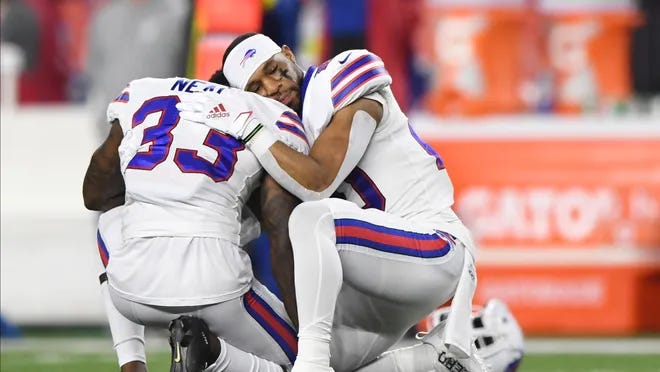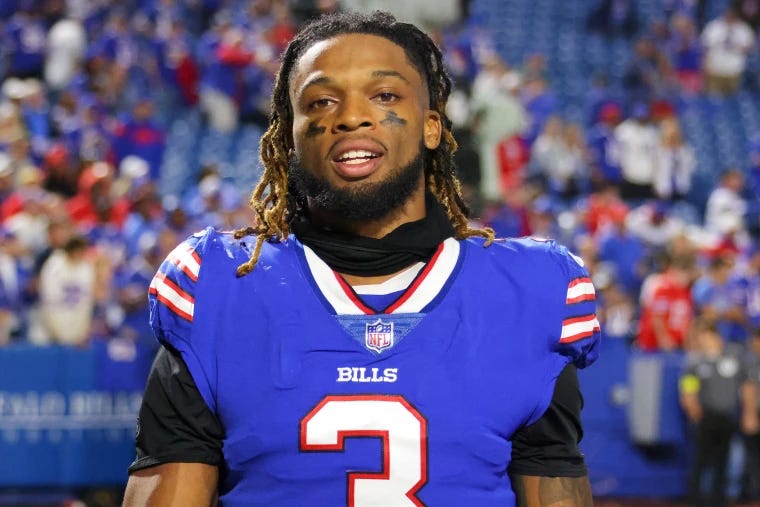Canzano: Making sense of Monday Night Football's terrible turn
Prayers for Damar Hamlin.
My 8-year-old daughter appeared in the family room on Monday night well after bedtime. She’d brushed her teeth, been tucked in, read a story, and given a glass of water. Maybe an hour later, I heard the sound of her feet on the stairs. My wife and I were on the sofa and Zia was standing there with a question.
“Is there any update on that football player?”
She was asking about Buffalo Bills defensive back Damar Hamlin. Zia was sitting with me earlier in evening, watching the Bengals and Bills play on Monday Night Football.
In the first quarter, Hamlin made a tackle and appeared to absorb a blow to his upper chest. He stood. Then, collapsed. The game stopped. Medical professionals responded. An ambulance drove onto the field. CPR was performed. We now know that the 24-year old Hamlin suffered cardiac arrest and he is in critical condition.
A few thoughts:
• NFL TOO SLOW: I hated that the NFL took so long to postpone the game. Hamlin was in distress. His life was in danger. The players and coaches on the field were distraught as the ambulance carrying Hamlin left the stadium. Fans watching at home were on their knees in their living rooms, praying.
I cringed when one of the MNF broadcasters declared that the game had “now become secondary.” A football game doesn’t suddenly become secondary. It is secondary. It always was. The league was out of touch and acted too slow to postpone the game.
Both teams were reportedly informed after the ambulance left that they had five minutes to warm up. Play would resume. Five minutes?!? Resume play?! It was a tone deaf response from a league that has a terrible record when it comes to player safety.
Thankfully, the head coaches of both teams were tuned in and acted like adults. Sean McDermott of the Bills and Zac Taylor of the Bengals deserve credit. They talked on the field, then met with game officials before taking their teams back to the locker room. The coaches understood the gravity of the moment. They were in touch with the emotions of their players and what mattered most — Hamlin, not some game. It was evident that the game wasn’t going to continue. Fans were done. Players were done. The coaches were done.
Why was the NFL the last invested party to accept that?
• SOCIAL MEDIA: The ESPN broadcast of the game turned understandably somber after the injury to Hamlin. I needed more, though. I listened to Troy Aikman and Joe Buck in the aftermath, but turned my attention to social media for more depth.
Twitter, Facebook and Instagram can sometimes be cesspools. But they weren’t on Monday night. What I found, particularly on Twitter, was mostly heartwarming and redeeming. Users were passing along vital information from reporters in the stadium, offering prayers, reminding each other of what is important, and humanizing Hamlin.
The Bills’ defensive back grew up in Pittsburgh and attended a Catholic high school, I learned. Hamlin was a four-star recruit who turned down offers from Ohio State, Notre Dame, Stanford, Clemson and Penn State. He instead chose to stay home and play at Pitt.
Several Twitter users offered a video of Hamlin hugging his mother before a recent game. Another, pointed out that Hamlin was involved with several children’s charities. He launched a GoFundMe toy drive for the holidays. It had a goal of $2,500.
Over the next 12 hours, donations pored into Hamlin’s toy-drive fundraiser.
It has now raised $3.8 million.
Is humanity doomed?
You wouldn’t know it from the outpouring of rational, connective, heartfelt support on Monday night. In the wake of a terrible incident, there was a lot of bold talk about prayer, faith and support for each other.
• HEARTS: I saw a few people make reference to the deaths of Hank Gathers and Reggie Lewis on Monday night. They both died from heart issues. But it was David Heller I found myself thinking about.
I’ve written several columns about Heller. The star Central Catholic High basketball player died in 2005 after his team’s final scrimmage before Thanksgiving. He came home, ate dinner, took a bath, told his mother he wasn’t feeling well, and decided to go to bed.
David Heller, 17, died of hypertrophic cardiomyopathy.
The David Heller Foundation has funded heart screenings for more than 42,000 teenagers in our region in the last 17 years. It has provided more than 300 AEDs to schools. Amid crippling anguish, the Heller family picked itself up and morphed into an unstoppable force. One that has kept a bunch of other families from losing children of their own.
We told our 8-year-old late on Monday night that Damar Hamlin was in the hospital and in the care of talented medical professionals. The CPR on the field helped get his heart started, we explained. He was sedated. We’d know more in the coming days.
We hugged her and she went back to bed.
Zia loves to watch football. The game makes sense to her. Four plays to get a first down. Six points for a touchdown. One more for an extra point. She enjoys settling in beside me on the sofa, picking a team to root for, and seeing it through.
When Hamlin collapsed, she was concerned.
We waited for him to get up. I expected he just had the wind knocked out of him. Or maybe a concussion. When the ambulance drove onto the field and the broadcasters confirmed that CPR was being used, I wasn’t sure what to think. I just pulled the 8-year-old close and we said a little prayer.
I’ll bet you did, too.
I appreciate all who read, support, subscribe and share this new, independent, endeavor with friends and families. If you’re not already a “paid” subscriber, please consider a subscription or a gift subscription for someone else:






Your daughter represents the best of the next generation. I hope you and your wife recognize her empathy comes from growing up around you two. Empathy comes out in your writing John - always has. I was dumbstruck that the NFL was actually considering restarting the game once they were aware of the life threatening nature of Damar's injury. As you point out, the players got it, the fans got it, the coaches got it and acted like leaders. Shame on the NFL for not taking the lead. I give the MNF broadcasters a break on one point you made. I think they were right to say, once they knew the gravity of the situation that, "The game has now become secondary." They were talking in the context of the game itself, not life in general. In my opinion, when you are watching a game of that importance, it is the primary thing on your mind at that time. Until it isn't. I'm giving them a pass.
Good column. Thank you.